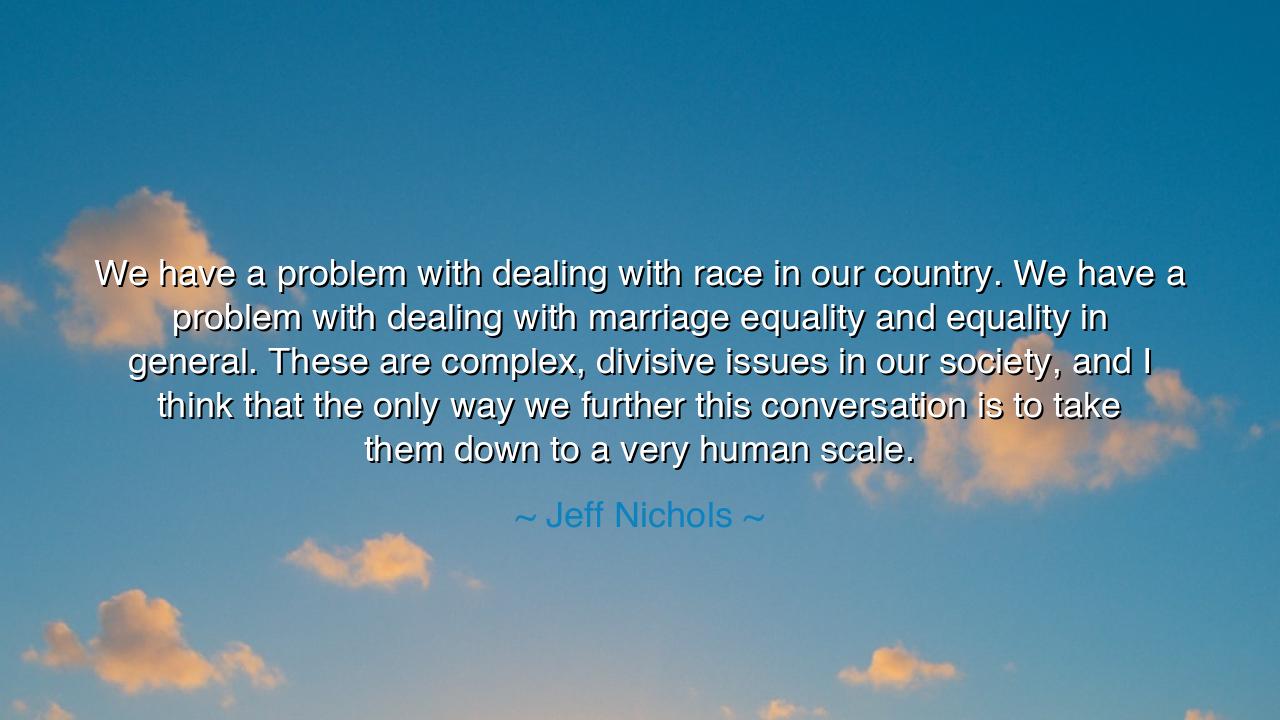
We have a problem with dealing with race in our country. We have
We have a problem with dealing with race in our country. We have a problem with dealing with marriage equality and equality in general. These are complex, divisive issues in our society, and I think that the only way we further this conversation is to take them down to a very human scale.






In the words of Jeff Nichols, “We have a problem with dealing with race in our country. We have a problem with dealing with marriage equality and equality in general. These are complex, divisive issues in our society, and I think that the only way we further this conversation is to take them down to a very human scale.” These words carry the weight of wisdom, for they cut through the noise of politics and ideology and return us to the beating heart of all human struggle: the individual soul, the shared experience, the story of one life that mirrors the lives of many. Nichols calls us back to simplicity, not by denying the complexity of these struggles, but by reminding us that they are lived, not in abstractions, but in flesh and blood.
The ancients knew this truth well. When philosophers sought to understand justice, they did not only speak of nations or empires, but of the household, the friendship, the relationship between neighbors. For how can a people claim to rule justly if they do not first practice fairness in their daily dealings? Nichols echoes this eternal wisdom: to confront race, to confront marriage equality, to confront equality itself, we must look not to slogans alone, but to the stories of mothers, fathers, sons, and daughters who live these realities.
History offers us one of the clearest mirrors in the story of Richard and Mildred Loving, whose marriage became the cornerstone of the U.S. Supreme Court’s decision in Loving v. Virginia. Their union, criminalized because of race, was not a matter of theory but of love between two human beings. Their struggle brought the issue of equality down to the human scale, and in doing so, they moved a nation. Nichols, who directed the film Loving, understood that it was not the language of law alone, but the witness of their lives—the tenderness between husband and wife—that changed hearts.
Yet Nichols also warns us that these are complex and divisive issues. The temptation is always to abstract them, to turn them into debates of ideology or power. But abstractions harden hearts. It is much easier to hate an idea than it is to look into the eyes of a neighbor and deny their humanity. To bring the conversation to the human scale is to break down walls, to remind even the most resistant soul that these struggles are about people—living, breathing, loving, suffering—just like themselves.
The deeper lesson here is that empathy is the bridge across division. A society may craft laws and build institutions, but unless hearts are touched, change is shallow and fragile. By focusing on the human scale, we remember that every act of prejudice wounds a real person, and every denial of equality diminishes not only the oppressed but also the oppressor. To see the human story behind the political struggle is to awaken the soul to compassion.
Therefore, the teaching is clear: if we wish to move forward on issues of race, marriage equality, and justice, we must resist the temptation to speak only in terms of crowds and categories. Instead, we must look at one another face to face, heart to heart. The liberation of a people is not only a question for governments, but a question of whether we, as individuals, will see in another’s story a reflection of our own humanity.
Practical steps flow from this wisdom. Listen to the stories of others, especially those whose experiences differ from your own. Engage in conversations with humility, not to win arguments but to understand. Resist reducing people to symbols, remembering that behind every debate are lives of flesh and spirit. And above all, practice empathy in daily life, for the great battles of equality are won not only in courts and legislatures, but in the small, consistent acts of kindness and recognition we give to one another.
Thus, Jeff Nichols’ words stand as a reminder and a charge: the path forward is not paved only with policies, but with stories, not only with laws, but with love. By bringing these struggles to the human scale, we do not diminish their importance—we magnify it, rooting the call for equality in the very heart of what it means to be human. And in that recognition, we find the power to transform both ourselves and the world.






AAdministratorAdministrator
Welcome, honored guests. Please leave a comment, we will respond soon